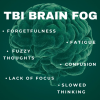Stress is a universal experience that can be caused by several factors such as work, relationships, financial challenges or health issues. It is a normal part of life, but when it becomes chronic, it can negatively impact your physical and mental health. One particular area that is severely affected by prolonged stress is your brain. As a part of the central nervous system, the brain plays an important role in controlling every aspect of our lives, and chronic stress has been found to negatively affect the way it functions.
Stress has a psychological impact that can manifest as irritability or aggression, a feeling of loss of control, insomnia, fatigue or exhaustion, sadness or tears, concentration or memory problems, or more.
Continued stress can lead to other problems, such as depression, anxiety or burnout.
When our bodies are under stress, the brain releases cortisol, a hormone that triggers the “fight or flight” response. While this can be helpful in dangerous situations, prolonged exposure to cortisol can lead to a weakened immune system, memory loss, and even mental health issues. The prefrontal cortex, the area of the brain responsible for decision-making and rational thinking, can also shrink in response to chronic stress.
Luckily, there are ways to combat the effects of stress on the brain, such as exercise, meditation, and seeking professional help.
Statistics
Americans are one of the most stressed out in the world. The current stress level experienced by Americans is 20 percentage points higher than the global average. In the United States, roughly 55 percent of adults experiences stress during a lot of the day.
Additionally,
- Stress causes 57% of Americans to feel paralyzed.
- 63% of American workers are ready to quit their job to avoid work-related stress.
- Chronic stress is commonplace at work with 94% of workers reporting feeling stress at work.
- Nearly two-thirds of professionals say their stress levels at work in the past year were higher than they were five years ago.
- U.S. adults surveyed in 2020 reported that increased stress has:
- Negatively affected their behavior (49%)
- Increased tension in their bodies (21%)
- Caused them to “snap” out of anger (20%)
- Caused unexpected mood swings (20%)
- A 2017 study showed that the top causes of stress in America were:
- Money (64%)
- Work (60%)
- The economy (49%)
- Family responsibilities (47%)
- Personal health problems (46%)
Younger generations are also experiencing a higher level of stress and anxiety than older ones in 2020. When asked to rate their stress level out of ten, here’s how U.S. adults responded by age group:
- Gen Z: 6.1
- Millennials: 5.6
- Gen X: 5.2
- Baby Boomers: 4.0
- Older Adults: 3.3
How Stress Affects the Brain
The stress response begins in your amygdala, a part of the brain involved with emotions such as fear. The amygdala then sends a danger signal to the hypothalamus, the part of your brain that regulates many key bodily functions like body temperature and heart rate. The hypothalamus then activates your sympathetic nervous system, the “alert“ response, which comes with an adrenaline boost, so you will be ready to face the potential threat. But after fight, flight, or freeze, your hypothalamus activates another stress response system: the hypothalamic-pituitary-adrenal (HPA) axis. The HPA axis works to keep your sympathetic nervous system engaged and on high alert. This releases cortisol — the stress hormone — into your system.
While cortisol helps your mind and body handle stressful events in the short term, chronic stress can cause the HPA axis to become dysregulated. It may release cortisol in fits and starts in response to more events, meaning you are feeling stressed more often, which can take its toll on your mind and body.
When cortisol levels remain elevated for a prolonged period, it can lead to a range of issues within the brain such as:
- Impaired memory and learning ability
- Poor decision-making skills and lack of focus
- Poor cognitive functioning
- Reduced brain cell communication
- Reduced gray matter volume in the brain’s prefrontal cortex
- The development of dementia
- Reduced hippocampal volume
- Mild cognitive impairment, which is sometimes a precursor to dementia or Alzheimer’s disease, is associated with the hippocampus and elevated cortisol levels.
- Over-exposure to cortisol can kill off brain cells.
Furthermore, stress can also impair and cause physical changes to the prefrontal cortex loss of spines and dendrites), which is the part of the brain that governs decision-making, impulse control, and other executive functions. Long-term stress can cause structural changes in the brain that can result in problems such as anxiety, depression, and post-traumatic stress disorder.
A study conducted on rats found that chronic stress decreased the number of dendrites, which are the branches that transmit signals between brain cells. These changes cause the brain to become overly sensitive to stress and can exacerbate the problem.
Chronic stress can also lead to a reduction in the number of neurons and dendrites in the hippocampus, which can interfere with our ability to form new memories and learn.
Emotional regulation is also a function of the hippocampus, but long-term stress can hinder this process. The hippocampus is negatively impacted when stress reduces the plasticity of the brain. When the hippocampus has less flexibility to change and adapt, it can lead to having a harder time managing emotions.
When chronic stress impacts emotional regulation, it can also make someone more likely to fall into thinking patterns like:
- self-criticism
- rumination, or getting into a rut of thinking about a particular stressor
- frequent worry
- feelings of loneliness
Stress can also affect your brain’s DNA through epigenetics, a process in which your environment interacts with and can suppress or activate family genes. Stress caused by childhood trauma is connected with epigenetic changes to the brain’s DNA and HPA axis.
Stress also has a huge effect on our sleep patterns. Stress can drastically interfere with your sleep, making it harder to fall asleep and stay asleep. Sleep is crucial for both mental and physical health. It helps the brain to consolidate memories, process emotions, and restore energy for the next day. Sleep deprivation can cause brain fog, mood swings, fatigue, and even more significant health problems such as obesity and heart disease.
During sleep, pathways form between nerve cells in your brain that help you remember new information you have learned. Sleep deprivation leaves your brain exhausted, so it cannot perform its duties as well. You may also find it more difficult to concentrate or learn new things. The signals your body sends may also be delayed, decreasing your coordination and increasing your risk for accidents.
Sleep deprivation also negatively affects your mental abilities and emotional state. You may feel more impatient or prone to mood swings. It can also compromise decision-making processes and creativity.
If sleep deprivation continues long enough, you could start experiencing hallucinations, and it can also trigger a manic episode in those who have bipolar mood disorder. Other psychological risks include:
- impulsive behavior
- anxiety
- depression
- paranoia
- suicidal thoughts
You may also end up experiencing microsleep during the day, which means you will fall asleep for a few to several seconds without realizing it. Microsleep is out of your control and can be extremely dangerous, especially if driving or operating heavy machinery.
How to Manage Stress Effectively
The good news is that you can manage stress effectively. Here are some techniques that have been proven to be effective:
Practice self-care: It is important to set time aside to practice self-care to reduce stress levels. This can include lighting candles, taking a bath, relaxing, reading, getting a massage or hair/nails done, walking, and so on. Those who engage in self-care report lower levels of stress and improved quality of life, while a lack of self-care is associated with higher risk of stress and burnout.
Reduce caffeine intake: Caffeine, which is found in tea, chocolate, coffee, soda and energy drinks, stimulates your central nervous system. This may lead to an increase in anxiety and may cause sleep disruptions. It is recommended to keep caffeine intake under 400 mg per day.
Learn to say no: By creating boundaries and learning to say no, less will be put on your plate, which can help lower your stress load. This is helpful if you find yourself taking on more than you can handle.
Go outside: Spending time in green spaces (nature) is a healthy way to help manage stress. As little as 10 minutes in a natural setting may help improve psychological and physiological markers of mental well-being.
Get organized. Using strategies to help manage your workload can also reduce stress. Each morning, write out a concrete list of tasks you need to accomplish. This way, your duties will not seem overwhelming. Making a list also gives you a clear end point so you know when you are done.
Mindfulness meditation: This involves paying attention to your body and surroundings in the present moment in a non-judgmental way. It can help alleviate stress, anxiety, and depression.
Deep breathing: Deep breathing exercises may help activate your parasympathetic nervous system, which controls the relaxation response. This includes diaphragmatic breathing, abdominal breathing, belly breathing, and paced respiration. The goal of deep breathing is to focus your awareness on your breath, making it slower and deeper. When you breathe in deeply through your nose, your lungs fully expand and your belly rises. This helps slow your heart rate, allowing you to feel at peace.
Exercise: Regular physical activity can help mitigate the effects of stress on your brain. It does this by boosting the production of endorphins, which helps improve mood and reduce stress levels.
Social support: Having a trusted friend or family member to talk to can help reduce stress levels, and provide a sense of belonging, which can have a positive impact on your mental health.
Sleep: Getting adequate sleep is crucial for optimal brain function. Aim for 7-9 hours of sleep per night to ensure your brain gets the rest it needs to recover from the day’s stresses.
Spend time with your pet: Having a pet may reduce stress and improve mood. When you cuddle with, or pet your animal, your body releases oxytocin, a hormone that is linked to a positive mood. According to studies, dog owners tend to have a greater satisfaction on life, higher self-esteem, reduced levels of loneliness and anxiety and a more positive mood.
Eat a nutrient-rich diet: eating a healthy, balanced diet can help reduce your stress levels. Foods rich in omega-3 fatty acids such as fish, nuts, and seeds can help keep your brain functioning properly by repairing and rebuilding brain cells. Dark green leafy vegetables such as spinach, kale, and broccoli, are excellent sources of vitamins and minerals that help reduce the negative impact of stress on the brain. On the other hand, caffeine, alcohol, and sugar can exacerbate stress and anxiety, so it is important to consume them in moderation.
Practice positive self-talk: Since stress can have a negative impact on your thoughts and emotions, it is essential to practice positive self-talk. Focus on positive thoughts and cultivate an attitude of gratitude. This can help shift your focus from the negatives to the positives in your life, which can have a profound impact on your mental health.
Minimize screen time: Smartphones, computers, and tablets are an unavoidable part of everyday life for many people, but overuse can lead to an increase in stress levels. Several studies have linked excessive smartphone use and “iPhone addiction” with increased levels of stress and mental health disorders.
Stress is a prevalent part of modern life, and it can be challenging to avoid completely. However, being aware of the impact of stress on the brain and taking steps to mitigate its effects can help preserve our mental and physical health. Examples of stress-reducing activities include mindfulness meditation, deep breathing exercises, regular exercise, and spending time with loved ones. If stress is causing significant problems in your life, consider speaking with a mental health professional or your doctor to find a treatment plan that works for you. Remember, taking care of your brain’s health is crucial for leading a happy, healthy life.
Resources:
www.nytimes.com/2019/04/25/us/americans-stressful.html
https://psychcentral.com/stress/our-brain-on-stress-forgetful-emotional#the-stress-response
https://www.ncbi.nlm.nih.gov/pmc/articles/PMC5619133/
https://aviv-clinics.com/blog/brain-health/how-cortisol-stress-hormone-affects-brain-health/
https://pubmed.ncbi.nlm.nih.gov/34485797/
https://www.singlecare.com/blog/news/stress-statistics/
https://www.healthline.com/health/sleep-deprivation/effects-on-body#Central-nervous-system
https://www.health.harvard.edu/mind-and-mood/protect-your-brain-from-stress
https://www.healthline.com/nutrition/16-ways-relieve-stress-anxiety#6.-Reduce-your-caffeine-intake



